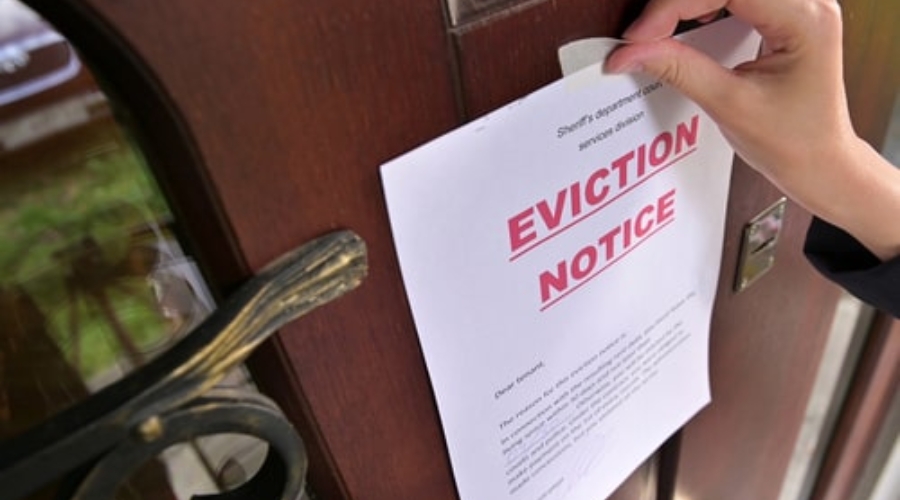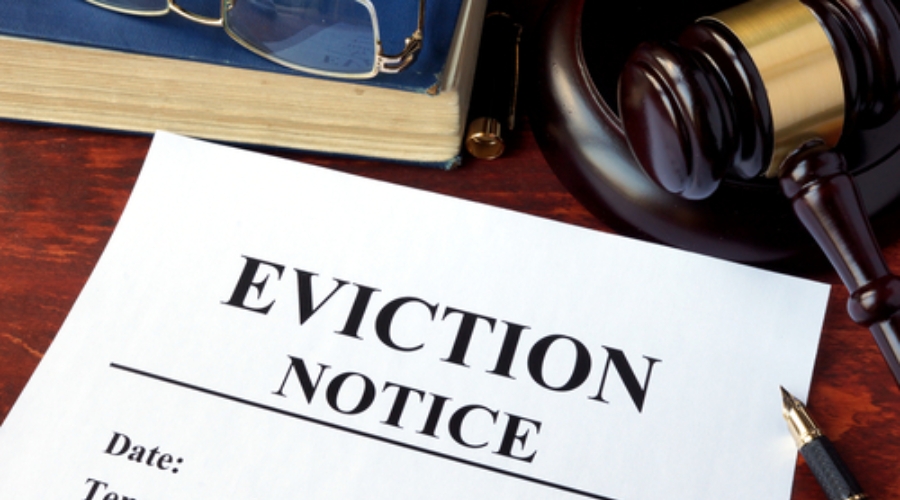Understanding the eviction process in Illinois is essential for both landlords and tenants navigating rental disputes in 2025. With recent legal updates affecting notice delivery, tenant rights, and credit reporting, staying informed isn’t just smart, it’s necessary. Whether you're initiating or facing eviction, knowing the correct procedures and new laws can protect your interests and prevent costly mistakes.
This guide from LeaseRunner breaks down everything you need to know about the eviction timeline and legal changes in Illinois.
New Illinois Eviction Law Updates for 2025
Starting January 1, 2025, five key changes took effect in California’s eviction laws. These updates aim to make the process clearer and fairer for both landlords and tenants.
The new laws cover:
- Stricter timelines for notices and court filings
- Clearer rules on required documentation
- Stronger anti-retaliation protections for tenants
- Updated procedures for serving notices
- Limits on using eviction history in tenant screenings
If you're a landlord, review these rules before starting an eviction. If you're a tenant, you now have more legal protection—but it’s important to know how to use it.

Landlord Retaliation Act (Public Act 103‑0831)
The Landlord Retaliation Act prohibits landlords from taking adverse actions against tenants who exercise their legal rights. Effective January 1, 2025, any rent increases, lease non-renewals, service reductions, termination attempts, or lawsuits that occur within one year of a tenant’s protected activity, such as:
- Reporting code violations
- Requesting repairs
- Joining a tenant union
- Testifying in court
Unless the landlord can prove a legitimate reason, these actions are presumed retaliatory. Tenants have the right to use this law as a defense in eviction cases. They may also sue for damages, including a rent refund or twice the actual loss.
Source: O’Flaherty Law
Tenant Credit Report Changes (Public Act 103‑0840)
Under Public Act 103‑0840, landlords in Illinois must now accept a reusable tenant screening report. This is a credit and background report created within the past 30 days by a consumer reporting agency.
Landlords cannot charge application or screening fees if the tenant provides this report, as long as it includes:
- The tenant’s name, contact information, and last known address
- Proof of income
- An eviction history check
- The date the report was created
This change gives tenants more control over the rental process and reduces upfront costs. For landlords, it means fewer barriers to entry — but also a stronger need to carefully review reports and follow proper eviction procedures.
If a landlord skips proper notice or relies on outdated information, it could weaken their legal standing in court.
Source: Clark Hill Law
New Requirements for Rent Receipts
Landlords must now issue written receipts for:
- Each rent payment
- Security deposits, within 10 days of receiving the funds
This rule strengthens recordkeeping and protects tenants in case of disputes.
Source: Clark Hill Law
Local Ordinance Protections (e.g., Evanston, IL)
Certain cities, like Evanston, have added local protections in 2025:
- 90-Day Notice Rule: Landlords must send renewal offers or nonrenewal notices at least 90 days before the lease ends. They cannot pressure tenants to decide earlier.
- Right to Pay and Stay: Tenants facing eviction for late rent can make a one-time payment to catch up (plus court costs, excluding attorney’s fees) and stop the eviction.
These local laws aim to reduce surprise evictions and give tenants a second chance.
Source: O’Flaherty Law
Expanded Service Options (Public Act 103‑0671)
Public Act 103‑0671 expands the methods permitted for serving eviction notices. Starting January 1, 2025, licensed private detectives or private detective agency employees can serve civil process statewide — not just in smaller counties — and must supply their license copy to the sheriff.
In counties with populations over 3 million, the serving party pays a $5 fee to the sheriff.
Acceptable Grounds for Eviction in Illinois
In the eviction process under Illinois landlord laws, landlords in Illinois can only evict tenants for legal reasons. Each reason requires a specific notice before starting the eviction process. Here are the most common grounds for eviction in Illinois..
Rent Nonpayment
One of the most common grounds for beginning the eviction process is the tenant’s failure to make a timely rent payment. If rent is not paid by the due date, landlords must issue a 5-Day Notice to Pay. This notice gives the tenant five days to either pay the overdue rent or vacate the property. If the tenant does not comply, the landlord may proceed with filing an eviction lawsuit in court.
Lease Violation
A landlord may also begin eviction proceedings if a tenant violates the terms of the lease agreement. This could include unauthorized pets, property damage, excessive noise, or other breaches. In such cases, the landlord must serve a 10-Day Notice to Cure or Vacate, giving the tenant an opportunity to correct the violation or leave the premises.
Illegal Activity
Engaging in illegal activity on the rental premises is another valid reason for eviction. Activities such as drug trafficking or other criminal behavior can result in immediate legal action. Illinois law requires landlords to serve a 5-Day Notice to Quit when the eviction is based on criminal conduct. There is no opportunity to remedy this type of violation.
Expired Lease or Holdover Tenant
When a lease ends and the tenant stays without signing a new one, they become a holdover tenant. In this situation, the landlord can issue a 7-day, 30-day, or 60-day notice to vacate, based on the lease's original terms and how long the tenant has stayed. This notice is the first step to start the eviction process when someone remains after the lease ends.
If you're dealing with a similar case, it’s also important to understand the rules around breaking a lease. Learn more in our guide to breaking a lease in Illinois.
Squatter or Unauthorized Occupant Evictions
If someone stays on the property without a valid lease—such as a squatter or unauthorized occupant—the landlord may begin the eviction process based on trespassing or unauthorized use. While Illinois law doesn’t always treat these cases as separate, they usually fall under lease violations or non-renewal issues. In situations involving squatters, it’s important to understand Illinois squatter rights before moving forward. Landlords must still give proper notice before taking legal steps.

How to Serve a Valid Illinois Eviction Notice
To initiate the eviction process legally in Illinois, landlords must serve a notice that complies with state laws. Here’s how to do it correctly, step by step.
Choosing the Right Notice Type (5‑, 10‑, 30‑Day)
The first step is selecting the appropriate notice.
- A 5-day notice is used for nonpayment of rent.
- A 10-day notice applies when a tenant violates the lease terms
- A 30-day notice is required for terminating a month-to-month tenancy.
Landlords must ensure they’re using the right notice for the situation; otherwise, the court may dismiss the case.
Include Legal Requirements for Notice Content
The notice must clearly state:
- The reason for eviction
- The number of days the tenant has to comply or vacate
- That failure to act may lead to legal proceedings
Missing or vague details can render the notice invalid in this eviction process.
Use Approved Methods of Delivery
In Illinois, landlords must serve the notice by one of the following legal methods:
- Personal delivery to the tenant
- Substituted service (to a household member aged 13 or older)
- Certified or registered mail
- Posting the notice on the door (only if the tenant cannot be reached personally)
Following the correct method is crucial to move forward with the eviction process in Illinois legally.
Avoid Notice Mistakes
Common errors include using the wrong notice type, failing to include the required information, or serving it incorrectly. These mistakes can lead to dismissal of the case or restart the entire eviction process. Double-check each step to ensure compliance with state law.
Step-by-Step Illinois Eviction Process (Forcible Entry & Detainer)
The eviction process in Illinois follows a specific legal sequence known as a Forcible Entry and Detainer action. Below is a clear breakdown of each step from notice to physical eviction, ensuring full legal compliance.

Step 1 – Serve the Proper Eviction Notice
The eviction process always starts with a written notice, tailored to the specific issue. This notice must explain the problem and give the tenant a set amount of time to fix it or move out. Whether it’s unpaid rent, a lease violation, or the end of a lease term, the landlord must follow the correct legal steps before moving forward.
Step 2 – File Eviction (Forcible Entry & Detainer) with Circuit Court
If the tenant ignores or fails to follow the notice, the landlord must take the next step: filing a formal complaint at the local Circuit Court. This is when the legal eviction process officially begins. Landlords should be prepared to submit proper paperwork to support their case.
Required documents include:
- A copy of the lease agreement
- The notice that was served to the tenant (e.g. 5-day notice or 30-day notice)
- Proof of service (how and when the notice was delivered)
- A rent ledger or record of missed payments
- Any communication records with the tenant (emails, texts, or letters)
- A completed eviction complaint form
Having these documents ready and organized helps avoid delays and improves your chances in court.
Step 3 – Court Issues Summons and Tenant Is Served the Notice
As part of the Illinois eviction process, once the case is filed, the court issues an eviction summons. This legal document must be served to the tenant at least three days before the court hearing. Landlords can serve the eviction notice in Illinois using a licensed process server, the county sheriff, or certified mail. Whichever method is used, the tenant must be officially notified.
Step 4 – Tenant Files Response or Default Occurs
After being served, the tenant can respond by filing an "appearance" and a written answer to the complaint. If they miss the deadline, the court may issue a default judgment in favor of the landlord.
Once a default judgment is entered, the landlord can request an Order for Possession and begin the process of removing the tenant through sheriff enforcement.
Even after a judgment, tenants still have limited options. They may file a motion to delay (or "stay") the eviction for a short time. They can also ask the court to cancel the eviction if it was granted unfairly or appeal the ruling.
Step 5 – Appear in Court and Bring Your Evidence
After the landlord files the eviction complaint and the tenant is properly served, the court will schedule a hearing. In Illinois, this usually happens 7 to 40 days after the tenant receives the summons and complaint. The exact timeline can vary by county.
At the hearing, both landlord and tenant must appear in court. This is their chance to present their side of the story.
The landlord should be fully prepared with evidence to prove the grounds for eviction, such as:
- A copy of the signed lease agreement
- Proof of unpaid rent or other lease violations
- Photos or videos showing property damage
- Email or written communication with the tenant
- A record of served notices (like a 5-Day Notice)
The tenant, in turn, can challenge the eviction by:
- Proving the rent was paid or the issue was resolved
- Arguing the eviction is retaliatory or discriminatory
- Pointing out procedural errors in the notice or filing
- Showing the landlord failed to maintain the property as required by law
This step is critical. The judge will review the evidence from both sides before making a final decision. It’s essential for landlords to come prepared with solid documentation—and for tenants to use this chance to defend their rights.
Step 6 – Obtain Judgment & Possession Order
If the judge sides with the landlord, the court enters a judgment and issues an “Order for Possession.” This is the court’s official decision that the landlord has the right to reclaim the property.
Following the judgment, the landlord must wait at least two days before filing for a Writ of Possession (also called a Writ of Restitution). This writ allows the sheriff to enforce the eviction if the tenant doesn’t leave voluntarily.
Once the writ is approved, the sheriff will schedule the eviction—usually within a few days to a few weeks. The writ remains valid for up to 75 days, during which the eviction can be carried out.
In most cases, the court gives the tenant an extra 7 to 14 days after the judgment to move out on their own. If they don’t, only the sheriff or authorized law enforcement can physically remove them. Landlords are not allowed to carry out evictions themselves.
After the eviction, tenants may have a short window to retrieve personal belongings. Any unresolved issues, like unpaid rent or property damage, can still be handled in a separate court case.
Step 7 – Sheriff Lockout After 120 Days
If the tenant still refuses to leave after the court's judgment, the landlord can ask the sheriff to carry out the eviction. In Illinois, this process usually happens within 7 to 14 days after the landlord obtains a Writ of Possession. If the landlord waits too long, they may need to return to court to request a new writ.
Illinois Eviction Timeline & Costs in 2025
The eviction process in Illinois typically takes anywhere from a few weeks to over a month, depending on the reason for eviction and the speed of court proceedings. Below is a breakdown of each step, the estimated time, and the common costs involved.
This eviction process follows a strict legal procedure. Landlords must issue proper notice and allow tenants the required time to respond before taking the case to court. Missing or incorrect paperwork can delay the process or lead to dismissal..
Essential Documentation & Evidence for Illinois Evictions
When starting an eviction in Illinois, landlords must ensure they have all the right paperwork in place. Courts expect clear, organized documentation to assess the situation fairly. Here are the main types of records you should have ready for an eviction hearing:
Lease & Rental Records
The lease is the foundation of the landlord-tenant relationship. A signed copy of the lease — along with any updates or extensions — is essential. It outlines the rental terms and can show whether the tenant broke any part of the agreement.
Rent Nonpayment Proof
If the reason for eviction is unpaid rent, landlords must provide detailed payment records. This includes rent receipts, payment ledgers, and any written communication regarding overdue balances. These serve as proof that the tenant failed to pay rent as agreed.
Lease Violation Records
For violations not related to rent, gather any relevant records like written warnings, notices, or email exchanges. If the issue involves damage, illegal activity, or improper use of the property, photos or videos may also help show what happened.
Property Condition Reports
Photos or videos — especially with time stamps — can help demonstrate the state of the property before and after the issue occurred. If possible, include written statements from witnesses to back up your claims. These details can strengthen your case by providing clear visual proof.
Read more about the difference between normal wear and tear and tenant-caused damage.
Common Illinois Landlord Mistakes to Avoid
When navigating the eviction process in Illinois, landlords must follow each step carefully to avoid delays, dismissals, or even legal consequences. Below are the most common missteps that can derail an otherwise valid eviction case.

Mistaken or Untimely Service
One of the most frequent errors during this eviction process is improper service of notice. State law requires that tenants be served with court papers at least three days before the scheduled hearing. This must be done using acceptable methods such as personal delivery, substitute service to someone over 13 residing at the unit, certified mail, or posting on the door only when others fail. Serving documents incorrectly or too late may result in the dismissal of the case.
Attempting Self-Help Eviction
Illinois law strictly prohibits landlords from conducting “self-help” evictions. Actions such as changing the locks, shutting off utilities, or physically removing a tenant without a court order are illegal. Engaging in any of these methods can lead to legal action against the landlord and potential financial penalties.
Filing Incorrectly or Skipping E-Filing
All eviction cases must be filed with the proper circuit court and often require electronic filing (e-filing) where mandated. Mistakes such as submitting the wrong forms, failing to pay court fees, or bypassing required procedures can delay the process. To avoid disruptions, landlords must strictly follow all court procedures as outlined by the appropriate circuit court.
Unaware of Sheriff’s 120-Day Enforcement Window
Once a judgment is issued, the landlord must request a Writ of Execution for the sheriff to enforce the eviction. However, some counties allow a 120-day window for the sheriff to carry out the order. Not understanding this timeframe can confuse or lead to unrealistic expectations regarding when the property will be vacated.
Ignoring New Retaliation, Fee, or Crime-Free Housing Laws
Recent updates in Illinois law have expanded protections for tenants, including laws against retaliatory evictions, excessive late fees, and discrimination based on prior contact with law enforcement. Overlooking these legal changes may put landlords at risk of violating tenant rights.
Want to screen potential tenants more thoroughly? Run a fast and reliable eviction check now to reduce your rental risk.
Conclusion
Navigating the eviction process in Illinois can be complex, especially with evolving laws and tenant protections. By understanding each step and staying up to date with legal changes, landlords can protect their investments while tenants ensure their rights are respected. For reliable support and digital tools that simplify the process, LeaseRunner is here to help you manage with confidence, every lease, every notice, every time.
Protect your rental business with a legally sound, state-specific lease agreement. Download our ready-to-use lease template today .
FAQs
1. Can a landlord evict a tenant without going to court in Illinois?
No. A landlord cannot legally evict a tenant without first going through the court process. Self-help evictions, such as changing the locks, removing belongings, or shutting off utilities, are strictly prohibited in Illinois. The landlord must serve proper notice, file a formal complaint in court, obtain a judgment for possession, and request the sheriff to carry out the physical eviction if the tenant doesn’t vacate. Any attempt to remove a tenant without a court order can result in legal penalties and damages for the landlord.
2. What happens after a tenant receives an eviction notice in Illinois?
After receiving a notice, the tenant has the opportunity to comply (e.g., pay rent or fix a lease violation) within the specified time. If they don’t comply, the landlord can file a lawsuit (Forcible Entry and Detainer). The tenant will then receive a court summons. At the hearing, the judge will review the case and may rule in favor of the landlord. If so, an order of possession is issued, and the sheriff may carry out the eviction. Tenants are encouraged to seek legal aid services, which can provide representation or guidance during this process, especially if they believe the notice was improper or retaliatory.
3. What is a Writ of Possession in Illinois?
A Writ of Possession is a court order issued after a landlord wins an eviction case. It authorizes the sheriff to physically remove the tenant from the property if they do not vacate voluntarily. In Illinois, the landlord must request the writ from the court, and it’s usually enforced within 7 to 14 days after judgment. The sheriff handles the enforcement, not the landlord. Landlords must not attempt to evict the tenant themselves, even after obtaining the writ.



